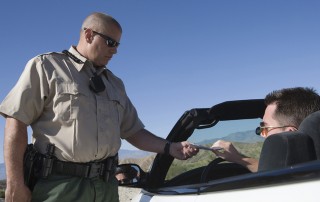Speeding is a factor in about thirty percent of the fatal traffic accidents in the state of New York. There’s no doubt that more lives could be saved if more motorists would drive just a bit slower.
Nevertheless, if you’re cited for speeding in Suffolk County, instead of just paying the fine, speak first to an experienced Long Island traffic ticket attorney. It’s usually worthwhile – for a number of reasons – to fight a speeding ticket.
One important reason to fight a speeding ticket is because the possible penalties for speeding in this state, listed below, are severe:
– a $90 to $150 fine and up to 15 days in jail for speeding up to 10 mph over the limit
– a $180 to $300 fine and up to 30 days in jail for speeding 10 to 30 mph over the limit
– a $360 to $600 fine and up to 30 days in jail for driving more than 30 mph over the limit
– a $45 to $150 fine and up to 15 days in jail for “excessive or inappropriate” speed
Another good reason to fight a speeding ticket is this: the consequences of a speeding ticket do not evaporate and disappear just because you pay the fine.
Paying the fine is an admission of guilt – a “conviction” in effect – that puts points on your driving record. When points go on your driving record, your automobile insurance rates can skyrocket.
In other words, a fine might be only the “tip of the iceberg” of a speeding ticket’s real long-term cost. “The fine is just the beginning,” according to John Bowman, Communications Director for the National Motorists Association.
HOW MANY POINTS DOES SPEEDING PUT ON YOUR DRIVER’S LICENSE?
If you are convicted of three or more speeding infractions over a period of eighteen months in New York, your driver’s license is revoked, and every New York driver should be aware that if you are accused of speeding in a construction zone, the fine is doubled.
If you are found guilty of speeding in New York, along with paying a fine, you’ll also have these points placed on your driver’s license:
– for speeding up to 10 mph over the limit: 3 points
– for speeding 11-20 mph over the limit: 4 points
– for speeding 21-30 mph over the limit: 6 points
– for speeding 31-40 mph over the limit: 8 points
– for speeding more than 40 mph over the limit:11 points
Whether or not you are actually guilty of speeding, these are among the reasons why most lawyers would tell you to learn all of your legal rights and options before you pay any fine for speeding.
With just a bit of research and work, along with some guidance from a qualified Long Island traffic ticket attorney, you might be able to pay a lower fine – or no fine at all – and have no points placed on your driving record.
For many jurisdictions in New York and across the United States, speeding tickets are a reliable source of revenue.
The National Motorists Association, which describes itself as a “grassroots alliance of motorists joined together to protect our rights,” says that local governments collect literally billions of dollars every year from motorists who pay traffic tickets.
The group encourages every driver to fight every traffic ticket.
WHAT SHOULD YOU DO IF YOU ARE TICKETED FOR SPEEDING?
The truth is, if you are cited for speeding in Suffolk County, you should take advantage of every available legal measure to try to reduce the amount of your fine and to keep it from affecting your auto insurance rates.
When you consider the combination of a fine, court costs, increased insurance rates, and points on your driver’s license, that’s a lot to pay for driving seven or ten miles per hour over the speed limit.
But whatever you do, don’t ignore a speeding ticket. It does not go away, and overlooking it will just lead to more fines or eventually cost you your driver’s license.
Whether it’s out of fear or just complacency, the overwhelming majority of drivers cited for speeding in New York simply admit their guilt, pay the fine, and deal with the consequences.
To plead not guilty to speeding in Suffolk County, obtain an attorney’s help at once, and make a copy of your speeding ticket because you’ll need to send the original right back.
Read the “not guilty” instructions on the speeding ticket and check the “not guilty” box on the back of the ticket.
Complete the information requested, sign it, and return it within forty-eight to the Suffolk County Traffic & Parking Violations Agency (SCTPVA).
WHAT CAN A TRAFFIC TICKET ATTORNEY DO ON YOUR BEHALF?
SCTPVA will respond with a letter telling you when and where a hearing – called a “conference” – has been scheduled. Your attorney will examine every detail of the speeding ticket. Anything that’s incorrect on the ticket works in your favor.
Your attorney can also file a discovery motion to obtain every available bit of information about your case – from the officer’s notes to the current calibration certificate for the radar device the officer was using.
Any detail might be helpful, and any information that’s inaccurate or missing might be grounds for having the charge dismissed.
Traffic court is not felony court, so many drivers will find the judge and prosecutor willing to offer some amount of flexibility.
Your attorney might be able to approach the prosecutor in your case and simply ask for a reduction of the charge and fine.
At the National Motorists Association, John Bowman says, “If you give the court the impression that you are serious about fighting the ticket, you are going to have a lot more leverage and control over the process.”
While no guarantee can ever be offered regarding the outcome of any legal procedure, a good criminal defense attorney may be able to have the speeding citation against you dismissed or at least reduced to a lesser charge.
In Suffolk County and anywhere on Long Island or in the New York City area, if you are dealing with a speeding ticket or any traffic violation, get legal help and speak immediately with an experienced Long Island traffic ticket attorney.
According to John Bowman and the National Motorists Association, “You can never go wrong contesting a ticket if you have the time and energy, because you’re almost always going to come out ahead.”











